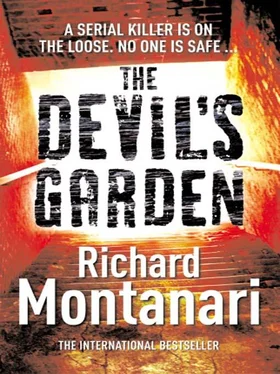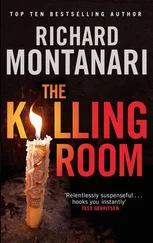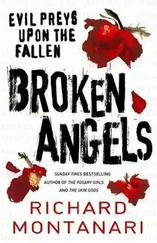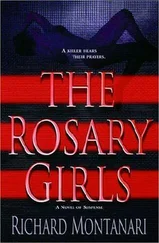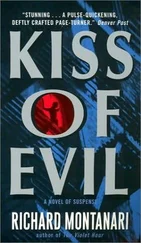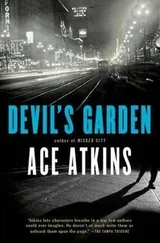Richard Montanari - The Devil_s Garden
Здесь есть возможность читать онлайн «Richard Montanari - The Devil_s Garden» весь текст электронной книги совершенно бесплатно (целиком полную версию без сокращений). В некоторых случаях можно слушать аудио, скачать через торрент в формате fb2 и присутствует краткое содержание. Жанр: Триллер, на английском языке. Описание произведения, (предисловие) а так же отзывы посетителей доступны на портале библиотеки ЛибКат.
- Название:The Devil_s Garden
- Автор:
- Жанр:
- Год:неизвестен
- ISBN:нет данных
- Рейтинг книги:4 / 5. Голосов: 1
-
Избранное:Добавить в избранное
- Отзывы:
-
Ваша оценка:
- 80
- 1
- 2
- 3
- 4
- 5
The Devil_s Garden: краткое содержание, описание и аннотация
Предлагаем к чтению аннотацию, описание, краткое содержание или предисловие (зависит от того, что написал сам автор книги «The Devil_s Garden»). Если вы не нашли необходимую информацию о книге — напишите в комментариях, мы постараемся отыскать её.
The Devil_s Garden — читать онлайн бесплатно полную книгу (весь текст) целиком
Ниже представлен текст книги, разбитый по страницам. Система сохранения места последней прочитанной страницы, позволяет с удобством читать онлайн бесплатно книгу «The Devil_s Garden», без необходимости каждый раз заново искать на чём Вы остановились. Поставьте закладку, и сможете в любой момент перейти на страницу, на которой закончили чтение.
Интервал:
Закладка:
As the day wore on, the Chechen separatists fought back, using everything they could: Russian-made, rocket-propelled grenades, fired from rooftops; Russian grenades thrown into tanks; even the deadly kinzbal, the prized Caucasian heirloom daggers. The number of dismembered and decapitated Russian soldiers all over the city were testament to the effectiveness of these comparatively primitive weapons. It was estimated that in the Battle of Grozny, Russians lost more tanks then they did in the battle for Berlin in 1945.
Over the month of January, federal forces would suffer even greater humiliations and defeat.
In each ill-conceived and executed battle, against clearly underestimated Chechen separatist forces, the bodies fell. All around Aleks, Russian soldiers and Chechen rebels were dead or dying. Yet, many times, while the blood of his fellow soldiers, his enemies, drained into the fields, mingling with the bones of centuries below, only Aleks was left standing.
Three times that January, in three fierce firefights, he emerged with little more than a scratch. His legend began to grow. The Estonian who could not be killed.
Then came January 15, 1995. One hundred and twenty federal soldiers were hunkered down in the marshes, outlying buildings, and silos just south of the Sunzha River. Intel, or what little they could gather with their primitive radios, told them that there were one hundred rebels holed up in the village. Their orders were to wait them out. For three days, with few rations, and even less sleep, they waited. Then the order came to advance.
At just before dawn Aleks’s unit of twenty began to make their way slowly across the frozen marsh. Some marched with newspaper stuffed into their boots for warmth. They did not make it far.
First came the mortar fire, huge 150-millimeter shells. The outbuildings and silos exploded on impact, killing all inside. Red rain fell. The shelling went on for more than six hours, the incessant roar of the explosions was deadening.
When the quiet came, Aleks dared to take a look. Body parts were scattered up the hillside. The armored cars were destroyed. The sounds of moaning could be heard beneath the staccato of automatic-weapons fire near the river.
Nothing stirred.
Then came the helicopters and their NURS mini-rockets.
In all, one hundred and nineteen Russian soldiers were killed. Most of the village was burned to the ground. Livestock were slaughtered and the streets ran crimson.
Only Aleks lived.
When the smoke cleared, and the screaming stopped, Aleks prepared to return to his base. He walked through the deserted village, now little more than blackened rubble. The smell of death was overpowering. At the end of the main street was a rise. In the near distance was a farmhouse, mostly intact.
As he strode up the hill, on alert, he began to feel something, something that had been growing within him for years. He stood tall, threw his rifle sling over his shoulder. He felt strong, the numbing fatigue and fear sliding away.
He looked through the doorway of the farmhouse, saw a Chechen woman, perhaps in her seventies, standing at her small kitchen table. On the table was an old leather-bound book. The walls were pitted clay, the floor dirt.
It was clear that the woman had seen the firefight, the grenades, the torn flesh and rivers of blood. She had seen it all. When it was over, she was not afraid of the Chechen rebels, or the Russian soldiers. She was not afraid of the war itself, or even of dying. She had met many devils.
She was afraid of Aleks.
He put down his weapon, and approached her, hands out to his sides. He was starving, and preferred to sit at a table. He meant her no harm. As he neared the woman, her eyes grew wide with horror.
“You,” she said, her hands beginning to tremble. “You!”
Aleks stepped into the house. It smelled of fresh bread. His stomach lurched in hunger.
“You know me?” he asked in halting Chechen.
The woman nodded. She touched the weathered book on the table. Next to the book was a loaf of black bread, a stone-sharpened carving knife.
“Koschei,” she said, her voice quivering. “Koschei Bessmertny!”
Aleks did not know these words. He asked her to repeat them. She did, then crossed herself three times.
In a flash she lifted the razor-sharp knife from the table, brought it to her throat, and slashed her jugular vein. Bright blood burst across the room. Her body slumped to the cold floor, quaking in its death throes. Aleks looked at the table. The loaf of bread was splattered with deep carmine.
Aleks fell upon the blood-soaked bread, wolfing it down, the taste of the old woman’s blood, along with the yeast and flour, an intoxicating mixture that both sickened and exhilarated him.
It was not the last time he would taste it.
In the dying light he read the book, a book of folk legends. He read the fable of Koschei the Deathless. There were many tales, but the one that moved him was the tale of the immortal Koschei – a man who could not die because his soul was kept elsewhere – and Prince Ivan’s sisters: Anna, Marya, and Olga.
He wept.
After his discharge, Aleks returned to Estonia, where he took odd jobs – carpentry, plumbing, fixing fifty years of shoddy Russian construction. He worked the slaughterhouses in the south, the mines in central Estonia, anything to get by. But he always new he was destined for something else, something greater.
Aleks befriended the mayor of the town, a man who also owned just about every business within fifty kilometers.
The man brought him along on a job, a job robbing an old Russian of his wealth accumulated on the backs of Estonians. Aleks had no loyalties, no God. He went. And found that the violence was still deep within him. It came easy.
Over the next few years, from the Gulf of Finland to the Latvian border to the south, and sometimes beyond, there was not a shop owner, business man, farmer, politician, or criminal enterprise, large or small, that did not pay Aleksander Savisaar tribute. He always worked alone, his threats and assurances couched in his ability to make believers of those who doubted his sincerity with torture and cruelty of such intensity, such speed, that his actions never had to be repeated.
By the age of twenty-seven his legend was widely known. In his pocket were politicians, law-enforcement agents, legislators. He had bank accounts and property in six countries. A fortune he never dreamed of.
It was time to turn his attention to his legacy but, with all his wealth and power, he did not know where or how to begin.
He began by building a house, a large A-frame set among tall standing pines atop a hill in Kolossova. Isolated, secure, and tranquil, he began to fell the logs he needed. By fall he had all the lumber milled, and had the structure fully framed.
He returned to the long-abandoned Treski orphanage, the place where he had been left. At great expense, he had locals tear it down stone by stone. Back in Kolossova he hired stonemasons to build a wall around his house.
Hurrying to close in the roof before the winter snows came, Aleks worked well into the evenings. One night, just as dusk claimed the day, he sat on the second floor, looking out over the valley as it began to snow in earnest.
He was just about to gather his tools when he thought he saw movement amid the stand of blue spruce to the west. He waited, stilling his movements, his breathing, dissolving into his surroundings, becoming invisible. He fingered the rifle at his side, shifted his eyes back and forth, scanned the clearing, but there was no movement. Yet there was something. A pair of shining pearls, seemingly suspended on the snow. He looked more closely, and a form began to take shape, seeming to grow around the glistening orbs. The high dome, the pointed ears, the dusty rose of a lolling tongue.
Читать дальшеИнтервал:
Закладка:
Похожие книги на «The Devil_s Garden»
Представляем Вашему вниманию похожие книги на «The Devil_s Garden» списком для выбора. Мы отобрали схожую по названию и смыслу литературу в надежде предоставить читателям больше вариантов отыскать новые, интересные, ещё непрочитанные произведения.
Обсуждение, отзывы о книге «The Devil_s Garden» и просто собственные мнения читателей. Оставьте ваши комментарии, напишите, что Вы думаете о произведении, его смысле или главных героях. Укажите что конкретно понравилось, а что нет, и почему Вы так считаете.
